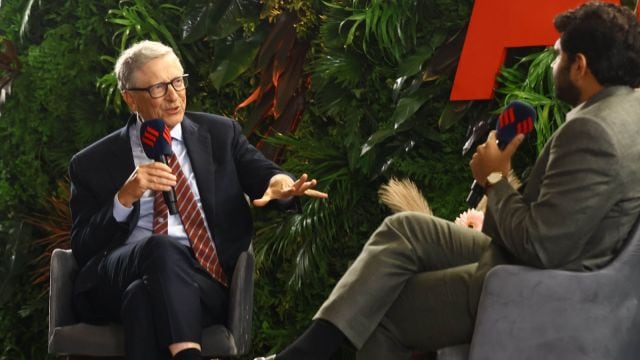March 28 – Bill Gates, the co-founder of Microsoft and a prominent philanthropist, expressed his views on the transformative impact of artificial intelligence (AI) at the recent Express Adda event. Gates emphasized that humans are not inherently “born to work” and suggested that societies must begin rethinking traditional ideas of work and productivity as AI continues to advance at an unprecedented pace.
Gates, 69, highlighted that AI is on the verge of making intelligence “nearly free,” ushering in a future where AI tools could significantly alter industries and reshape the global workforce. While many experts have voiced concerns about AI’s potential to displace jobs, Gates appears to be encouraging a shift in perspective, suggesting that societies should prepare for a world where conventional job structures may no longer be necessary.
AI’s Role in Healthcare and Education
Gates expressed optimism about AI’s role in improving key sectors such as healthcare and education. He reiterated his belief that AI-powered tools will soon become integral to these fields, enabling better outcomes and democratizing access to quality services.
“In the coming years, AI tutors will be able to provide personalized education to students, tailoring lessons to their individual needs. Similarly, AI diagnostic assistants will enhance healthcare by assisting doctors in identifying diseases faster and more accurately,” Gates remarked. He believes these advancements will not only bridge gaps in access to critical services but also empower people to achieve better outcomes, regardless of their socio-economic background.
Challenging Conventional Ideas About Work
Gates challenged the conventional notion that humans are destined to work, suggesting that the concept of jobs is merely an “artefact of the shortage.” He pointed out that historically, the need for labor arose because of resource scarcity and the limitations of technology. However, as AI drives society toward an era of abundance, Gates argues that the traditional structure of work may become obsolete.
“Jobs exist because of a lack of resources, but as AI fills in many gaps, it’s hard to reprogram your brain to imagine a future where work is not the central organizing principle of life,” Gates explained. He suggested that societies will need to redefine purpose, productivity, and personal fulfillment in a world where AI takes on many traditional tasks.
Redefining Purpose in a Post-Scarcity World
As AI continues to advance, Gates highlighted the importance of reorienting societal values toward purpose and meaning beyond work. In a post-scarcity world, where AI performs many of the tasks that currently define human labor, Gates believes societies must develop new frameworks for fulfillment and engagement.
He suggested that with AI taking care of repetitive and time-consuming tasks, people may have more freedom to explore creative pursuits, contribute to their communities, and engage in activities that foster personal growth and well-being. However, he acknowledged that shifting societal mindsets away from the idea of work as a defining aspect of life would not be easy.
India’s Role in Shaping the Future of AI
During the event, Gates also praised India’s contributions to the AI revolution, acknowledging the country’s growing role in shaping technological advancements. He emphasized that India’s thriving technology ecosystem and its large talent pool place the country in a strong position to lead in AI innovation.
Gates highlighted India’s success in leveraging digital platforms to expand access to financial services, education, and healthcare. He expressed confidence that India will continue to play a pivotal role in harnessing AI’s potential to address societal challenges and drive inclusive growth.
A New Era of AI-Driven Transformation
As Gates painted a picture of a world where AI reshapes industries and redefines the concept of work, he underscored the importance of preparing societies for this inevitable transformation. He urged policymakers, educators, and communities to begin thinking about how to navigate this new era, ensuring that AI’s benefits are distributed equitably and that people are equipped to find meaning in a future where work may no longer be the cornerstone of human existence.
While the world grapples with the rapid pace of AI-driven change, Gates’ insights at Express Adda provide a thought-provoking perspective on how societies can adapt and thrive in a future where intelligence is abundant, and traditional notions of labor may no longer apply.



0 Comments